- Home
- Brian Keene
Where We Live and Die Page 6
Where We Live and Die Read online
Page 6
I crashed in my old room in a bed that no longer fits me, and when I woke up later, I asked my parents if they’d enjoy it if the baby and I spent the night. They said they would.
I didn’t go back home until Cassi returned three days later.
ENTRY 15:
That takes us back up to the present. Or at least a close proximity of the present. After the baby monitor incident, things quieted down again. I still heard the occasional beeping sound. The baby still looked at the top of the driveway and waved hello. I still had the dreams once in a while, and Cassi was still uncomfortable smoking on the deck at night. But the glider didn’t rock anymore, at least, not that I’d seen. There were no floating orbs. No “Chugga chugga, choo choo, spin around. Every letter has a sound.” No Elmo asking me for a hug.
I didn’t tell anyone about what happened. I didn’t want them to think I was crazy.
And here we are. When I started writing this diary, I was forty-one, and as I finish it, I’ve been forty-two for a few months. Other than that, not much has changed.
It is December 19, 2009 and as I type this, the Mid-Atlantic is in the midst of one mean motherfucker of a snowstorm. Earlier, I took a yardstick outside of my office and measured the accumulation. In the non-drift areas, we have twelve inches of snow. The National Weather Service is predicting we could have a lot more. I think they’re right, since the snow shows no signs of abating. On Twitter, Dave Thomas (my sometimes assistant, better known to the world as Meteornotes) called this DEATH STORM 2009. I think that’s a good name for it. I think it’s fine and proper and has a beautiful ring to it.
But then again, I’m on a death trip.
My neighbor and I have been taking turns plowing the driveway with his snow-blower. On my last trip up to the top of the driveway, I noticed that the cross was no longer there. I know it was there yesterday, because I see it every time I go up for the mail. But some time early this morning, a snowplow hit it, along with the guardrail. There are a few little pieces of wood scattered amongst the snow drifts on the side of the road, but the rest of the cross is gone. I wonder if, when the snow melts and winter passes, will the victim’s family return and put up a new memorial to remember her by? Or do they remember her in other ways? Or is her memory beginning to fade?
Yesterday, after poking around online again and coming up empty (Google can tell me the average annual rainfall for Botswana, but it can’t tell me who died at the top of my driveway), I decided that it was time to get serious about this whole thing. One of the benefits of having freelanced for the York Dispatch in the past is that I still have access to their clippings library and archives. I once featured that archival room in a novel, Ghost Walk. In real life, it’s pretty much like I described it in the book. There is row upon row of massive filing cabinets, filled with clippings from the paper. They are arranged by alphabetical category and span decades of history—going back all the way to the paper’s inception. The really old stuff is on microfilm, rather than paper, and there’s some talk of digitizing the whole collection, but that costs money and newspapers are making about as much money as mid-list horror writers these days.
I drove to the newspaper’s office, which is located in downtown York City, told the girl at the door who I was, and then went downstairs to the archives. Things hadn’t changed since my previous visit (I’d last been there about a year and a half ago, doing research for an aborted non-fiction book on powwow magic). A few staffers recognized me, and I exchanged pleasantries and made small talk. Then I got to work.
It took me about twenty minutes to find what I was looking for. I pulled out a file, flipped through the clippings till I found the date, and there she was.
The girl on the glider.
Staring up at me from the past.
Her family had provided the newspaper with her senior photo. In it, she was smiling. I wondered what she was thinking about when it was taken. All of those possibilities that lay ahead on the road of life? The future must have seemed wide open. Little had she known, when the picture was snapped, that the road of life detoured into an embankment at the top of my driveway just a year later, and that none of those dreams or possibilities would ever come to pass.
We go through the days thinking we have our whole lives ahead of us. We put off things until tomorrow. We spend time consumed with work and obsessed with making enough money to provide for our loved ones, but in that pursuit, we sacrifice spending time with the very people we’re working to support. I spend all of my days writing. That’s all I fucking do. From eight in the morning until five or six at night. Write. Write. Write. Hope someone sends a check on time. Write. Write. Write some more. And at what cost? Sure, my family have a roof over their heads, but if I found out tomorrow that these tumors are no longer benign, and I only had a week to live, would it have been worth it? Would I then contact Mike and Nate and tell them that, instead of finishing whatever stupid novel is left on my computer, they spend time playing with my son instead, because I didn’t have time to finish doing that either? Would I ask them to pay more attention to my wife for me, because I’d been unable to do so?
There are things I want to do in life. I want to have hobbies again. I want to become a backyard astronomer and take up amateur photography and fish in my trout stream more often. I want to ask my kids how their day was and rub my wife’s feet every night and take the dog for a long walk each and every day, rain or shine. I want to spend more time with my parents, and tell them that I appreciate them and that they are loved. I want to do all of these things, but I never do. I put them off until tomorrow, so sure that I’ll get them done…eventually.
But eventually doesn’t always happen. The girl on the glider had dreams, too. She had things she wanted to do. I stood there, flipping through the file. There were three articles about the accident. The first simply recounted the accident details, including statements from the State Police and the County Coroner. The second was the follow-up article that I was reading. The third was her obituary. I read them all, and got to know her. I learned about her dreams and wishes and desires. She’d put them all off for whatever reason, figuring they’d happen eventually…and then she died unexpectedly at the top of my driveway.
After I’d finished, I put the file away and left the building and came back home. The sky was overcast and gray. Death Storm 2009 was approaching. I wondered what I should do next. I couldn’t very well go to her parents, could I? Just show up and knock on their door and say, “Hi, I’m Brian Keene. The guy who writes those books? I’m sorry to bother you, but your daughter has been haunting my house this past year, and I was wondering if you could ask her to stop? I think she might not know that she’s dead. She seems to be trying to contact someone. Have you received any weird text messages lately?” They’d have me arrested. Or shoot me. Or both.
I decided to do a little magic. I’ve written enough about it that I know the basics. The most important part of magic, regardless of which discipline you’re practicing, is the act of naming. Names are power. If you know something’s true name, it gives you power over it.
I walked to the top of the driveway. The sun had just gone down and the road was extremely dark. There was very little traffic, on account of the impending snowstorm. I stood there, shivering, hands in my pockets, and stared at the spot where the accident had occurred. Without really knowing what I was going to say, I began to speak out loud.
“Hi. My name is Brian. Now you know my name. I know your name, too. I found it today. Your name is ___________. I’m really sorry for what happened to you. I’ve got this theory that maybe you’re feeling a little lost. Maybe a little lonely? Maybe you’re not sure where your friends went? Maybe you keep texting them, but nobody is calling you back.”
I paused. The wind rustled the trees.
“Did you ever watch The X-Files? I don’t know, maybe that was before your time. Maybe your parents dug it, though. I was a big fan of the show. There was this one episode where Agent Mulder is hidin
g out on an Indian reservation, and one of the characters quotes an old Native American saying: ‘Something lives only as long as the last person who remembers it.’ I’m not sure how that applies to this situation, but I’m certain that your parents and your friends remember you.”
I paused again, glancing around to make sure that no one was listening. I didn’t need one of my neighbors going, “Oh, look. Keene is standing at the top of the driveway talking to imaginary people.”
When I was sure we were alone, I continued.
“I think you were sent here to teach me something. I think maybe that’s why you can’t pass on. See, I’m an agnostic when it comes to all of this spiritual stuff. I’ve tried Christianity and Buddhism and every other kind of ‘anity’ and ‘ism’ but at the end of the day, I lack faith—and faith is what is required of any belief system. I want to believe that there’s something after this. I want very badly to believe in an afterlife, but I haven’t been able to. Until now. I don’t know what you are. You might be a ghost or a spirit. You might be conscious. You might just be an echo of time—a psychic after-effect. Or maybe you’re just in my head. I don’t know. But I know that I now believe. So I want to thank you for that. You’ve shown me that a part of us—some vital part of what makes us who we truly are—lives on after our death. I don’t have to rely on a literary legacy of books for people to remember me after I’m gone. I don’t have to bust my ass cranking out one pulp novel after another just to ensure that I live on. Something lives only as long as the last person who remembers it. If I get my shit together and change my ways, I’ll live on in the memory of my kids and my grandkids and those whose lives I’ve touched in some way.”
I reached up and wiped a tear away. I hadn’t realized I was crying until just then.
“I’m forty-two. I used to think, ‘Well, I’m only in my early forties. I’ve still got plenty of time.’ But I bet you thought that, too, right. And you were only nineteen. You were only nineteen and then suddenly, it was over before it had ever even really started.”
I ran out of words. My last sentence seemed to hang there in the cold air, just like my breath was doing.
“I’m not sure what happens next. I’m going to go back down to the house and start living. Try to save my marriage. Try to be a better father. Maybe you should look around for a light or something. They say there’s supposed to be one on that side. I don’t know. If you can’t find one, I guess you’re welcome to stay here, I guess. Anyway, thanks again.”
My shoulders slumped. I suddenly felt very silly. I walked back down to the house, went out to my office, and turned off my computer. My Blackberry was flashing at me, informing me that I had voice mail and unanswered text messages. I turned it off without reading or listening to them. I stayed long enough to pat Max on the head and show him a little extra attention. Then I went inside the house.
Cassi and the baby were in the living room. The dog and cat were lying on the couch. The baby was playing with his train. He looked up, saw me, and smiled.
“Hi, Da-da!”
“Hi, buddy. How are you? What are you doing?”
“Choo-choo train. Da-da push!”
So I did. I pushed him all around the living room, and sang along with the toy as I did.
“Chugga chugga, choo choo, spin around. Every letter has a sound.”
ENTRY 16:
There was over a foot of snow in the driveway this morning, and when I went outside, I saw footprints in the snow. They started at the top of the driveway, came down to our house, circled both our cars, came up onto the porch, and then went back up the driveway again.
My neighbor told me later that he saw what made them. It was a stray dog. A Husky, with a collar on. We’re going to try to catch it later, and find it a home.
Just a dog. Nothing more.
No dreams last night, and no work today.
I’ve got more important things to do.
I’ll work when I’m dead.
This happened to me last night, and I need to talk about it to someone, and since my publisher is after me to get a story turned in on time, that someone is you. Call it meta-fiction if you like, except that there’s not much fiction to it.
It was just before six in the evening. My girlfriend had gone home at nine that morning, and I’d been writing non-stop all day. That doesn’t sound like hard work, typing words on a laptop for nine hours, and it’s not, in the grand scheme of things. I’ve had hard jobs—sweating in a foundry, moving boxes on the loading docks, driving a tractor trailer for fifteen-hour stretches. Writing is a breeze compared to those, and a lot more fun. Still, it was a lot easier to write for nine hours straight when I was in my twenties than it is in my early forties. My back hurt, my wrists ached, and my fingers were stiff with the onset of arthritis—a relatively new affliction that biology and genetics had given me for a forty-second birthday present last year.
I decided to take a break, and while I was brewing a fresh pot of coffee, it occurred to me how quiet the house seemed, and how lonely I was. I’ve got my youngest son Mondays through Thursdays, and my girlfriend visits me when she can, but when the two of them aren’t here, I spend my time alone and spend my alone time writing. Writing is a solitary act, and it makes for a solitary existence. Hell, I should know. Writing is the reason I’m alone. I’m good at it—writing, I mean. I’m not so good at being alone, despite the fact that it’s how I spend my life. But I’m good at writing, or at least, that’s what my editors and publishers tell me. I sometimes suspect they only tell me that because I make them lots of money. People will tell you whatever they think you want to hear when you’re making them a lot of money. I’ve often wanted to purposely write a bad book, just so I can see their false praise for what it is, but I wouldn’t do that to my fans and readers. And I wouldn’t do it to myself. Because other than being a father, writing is the only thing I’m good at. It’s the only constant in my life. The only thing I can always count on.
And all it cost me was everything else.
For starters, writing has resulted in two failed marriages. One in my twenties, when I was living in a trailer with a young wife and infant son, working all day in a factory and coming home at night to try my hand at becoming the next Joe Lansdale or David Schow or Skipp and Spector. Another in my thirties, when I’d succeeded in my career as a writer, and was living in a nice house with a wonderful second wife and another infant son, writing all day and then writing all night, as well, just to stay on top of the heap of bills and keep a roof over our heads.
Writing has also cost me friends—both from before I became a writer and after. Childhood chums, pissed off that I mined so much of our lives for fiction. Friends from high school and old Navy buddies who I no longer had anything in common with, who assumed that just because they saw my books in stores or my movies on television that I must somehow be wealthy and hey, could I lend them a few dollars or help them get published or be the dancing monkey and star attraction to impress all their friends and family members with at their next Christmas party. Fellow writers and peers, people I’d come up with, promised to do it together with, only to have them lose touch with me when I got successful.
Or maybe it was me who lost touch with them. Maybe it was my own insecurities—my own guilt at achieving everything we’d all hoped for, while they still hadn’t. And maybe that applied to those old high school friends, as well. Maybe they were just proud of me, and I mistook that pride for something else. And maybe those childhood chums were right to be angry. Perhaps not all of our personal demons needed to end up as grist for my fiction mill. And maybe—just maybe—my two ex-wives had been right to expect me to choose a healthy relationship with them instead of fifteen hours at a keyboard living inside my own head seven days a week, instead of talking to them or living with them.
Those were the thoughts that kept me awake some nights, and on those nights, I drank more whiskey and continued to write. It was a self-perpetuating vicious cycle. Lose everything bec
ause of writing until the only thing you have left is the writing itself. Rinse and repeat.
But it’s too late to do anything about it now. And like I said, I’m good at it. So I have that going for me. And not everything has been lost. I have great relationships with both of my sons. My youngest is four, and even though his mother couldn’t be married to a writer any longer, we remain best friends and work well together as co-parents. My oldest is twenty-one, and although he’s a young man now, when I look at him I still see the little boy who read through his daddy’s comic book collection and played superheroes on my living room floor for hours and talked about how he was going to be a writer just like me when he grew up. Thank God and Cthulhu he didn’t. That desire lasted exactly one season when he was ten. Now he’s a senior at Penn State and studying to be a social worker. The pride and love I feel for him is as tangible as the lump I get in my throat when I think about how much he’s grown. He doesn’t talk about writing anymore, and for that I am grateful. I only hope that his younger brother does the same. My oldest son doesn’t read my books and his only association with them is when he goes to science fiction, fantasy, and horror conventions wearing a t-shirt with one of my book covers on it. When a cute girl approaches him and compliments the shirt and tells him they are a fan of my work, he smiles and says, “Yeah, he’s my dad.” I’m okay with this. I will probably never leave either of my sons a lofty inheritance, so the very least I can do is get them laid.
My relationship with my girlfriend is good, too. Maybe that’s because we’re both writers. We know exactly what goes into this life of ours, and what the demands are. But I suspect that same knowledge is what keeps us from permanently cementing this relationship and making it official. Because we know that no matter how close we are, we’ll always have a laptop between us—or two laptops, in our case. Because we know that sooner or later, the good things will go away, leaving only fodder for the muse.

 The Rising
The Rising Entombed
Entombed Take the Long Way Home
Take the Long Way Home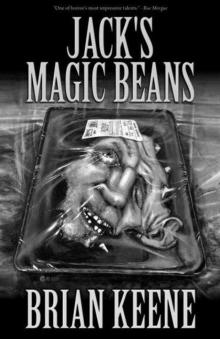 Jacks Magic Beans
Jacks Magic Beans Ghost Walk
Ghost Walk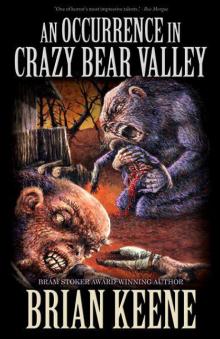 An Occurrence in Crazy Bear Valley
An Occurrence in Crazy Bear Valley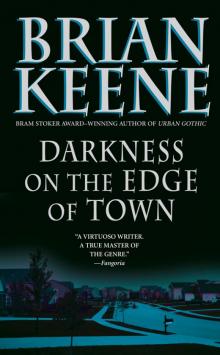 Darkness on the Edge of Town
Darkness on the Edge of Town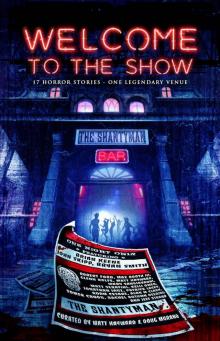 Welcome to the Show: 17 Horror Stories – One Legendary Venue
Welcome to the Show: 17 Horror Stories – One Legendary Venue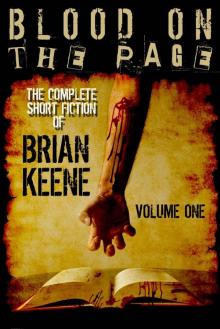 Blood on the Page: The Complete Short Fiction of Brian Keene, Volume 1
Blood on the Page: The Complete Short Fiction of Brian Keene, Volume 1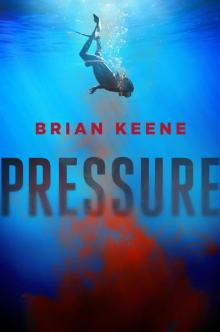 Pressure
Pressure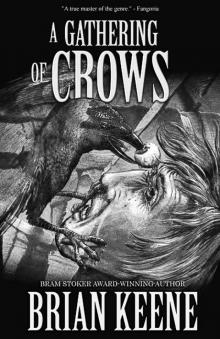 A Gathering of Crows
A Gathering of Crows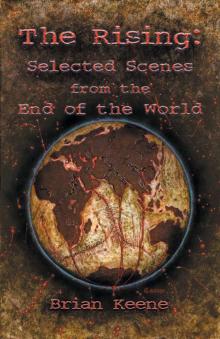 The Rising: Selected Scenes From the End of the World
The Rising: Selected Scenes From the End of the World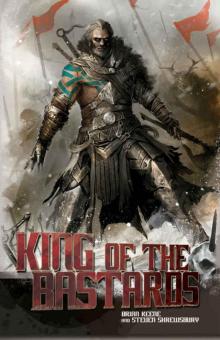 King of the Bastards
King of the Bastards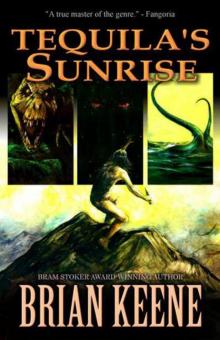 Tequila's Sunrise
Tequila's Sunrise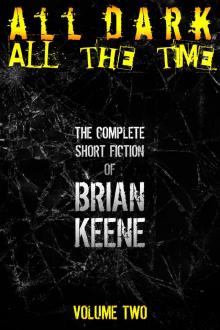 All Dark, All the Time
All Dark, All the Time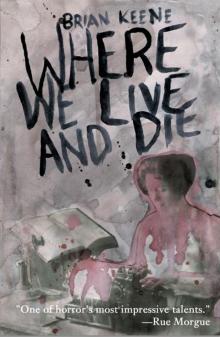 Where We Live and Die
Where We Live and Die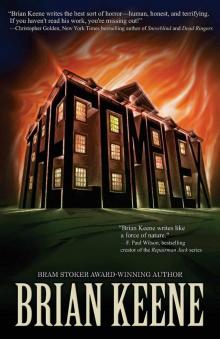 The Complex
The Complex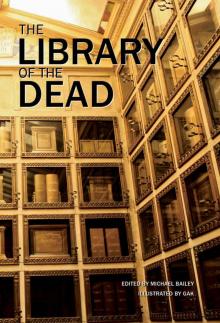 The Library of the Dead
The Library of the Dead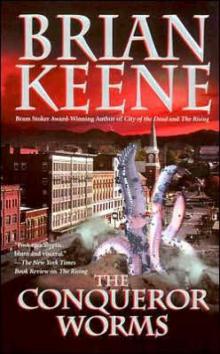 The Conqueror Worms
The Conqueror Worms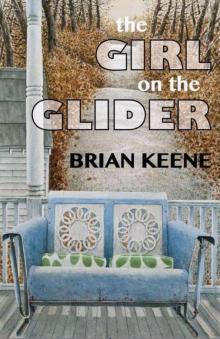 The Girl on the Glider
The Girl on the Glider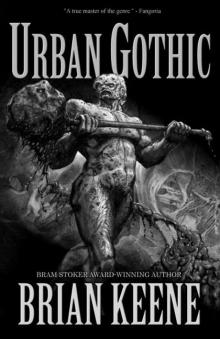 Urban Gothic
Urban Gothic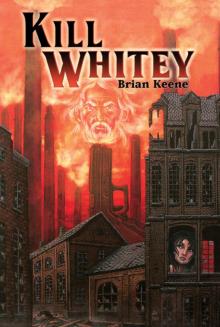 Kill Whitey
Kill Whitey Terminal
Terminal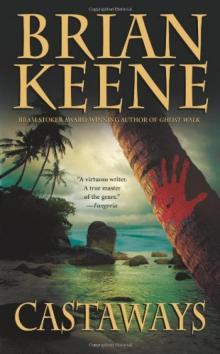 Castaways
Castaways